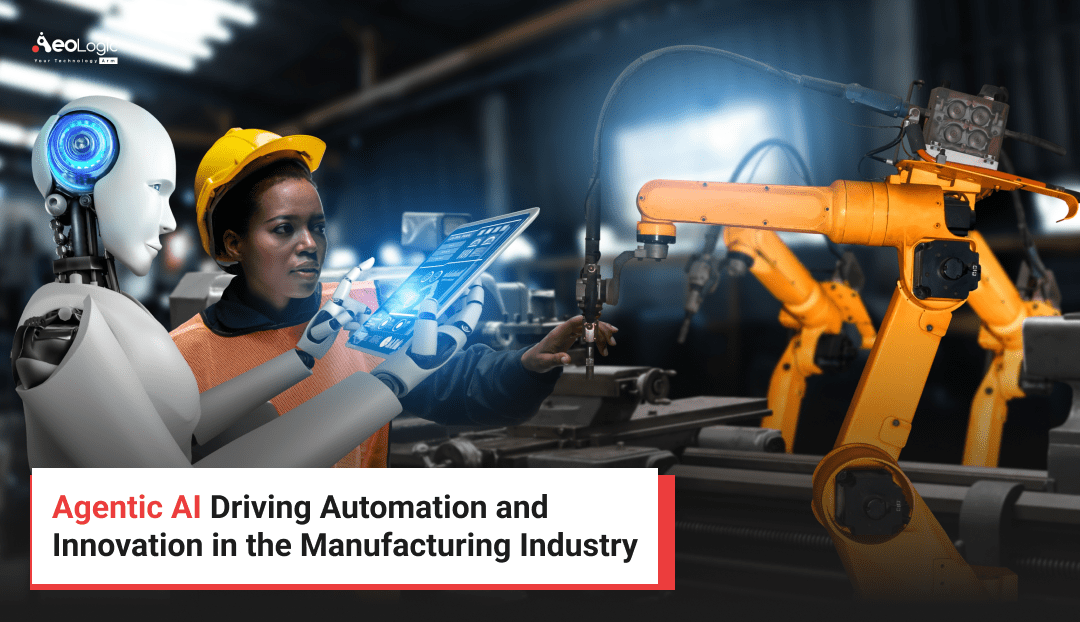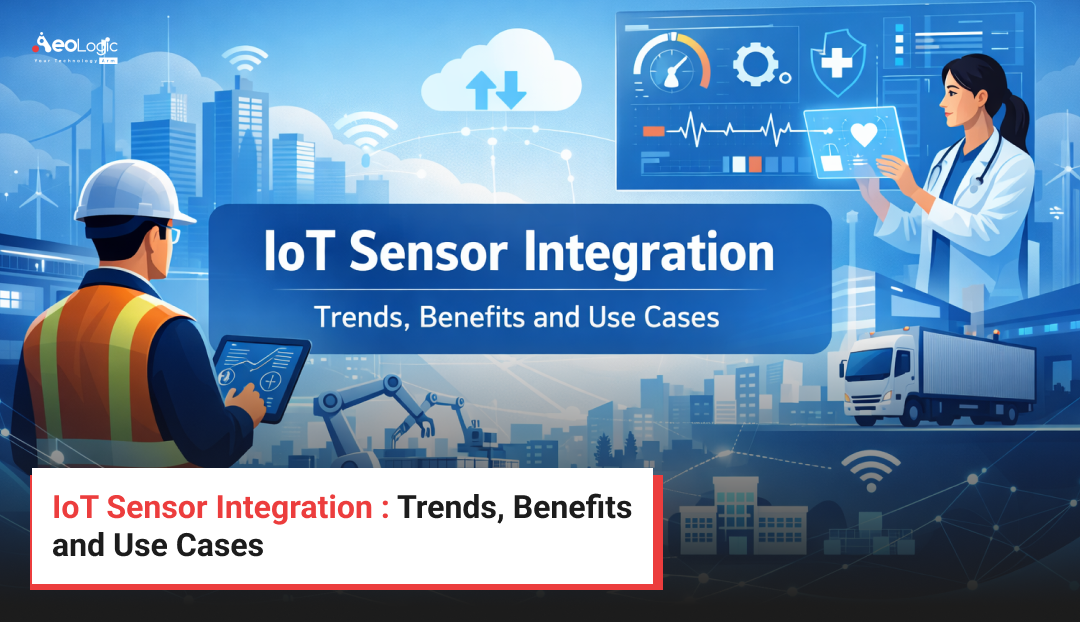Without a doubt, the manufacturing industry has been one of the important industries that manufacture products for people and their daily needs. There are many aspects that have been revolutionized since the digital transformation. However, there are still many aspects, operations, and areas that need improvement. Manufacturers still face problems related to increased time consumption on routine tasks, poor operational efficiency, poor product quality, security risks, a lack of innovation, inadequate supply chain optimization, insufficient forecasting tools and techniques, and more.
Without addressing all these issues, the manufacturing industry cannot evolve in a better manner to produce better products and services. The agentic AI-powered autonomous solutions are contributing their best to make things better in the manufacturing industry than ever before.
Overview
The agentic AI not only offers automation solutions but also offers all the capabilities that conventional AI possesses. The agentic AI solutions offer real-time analysis, operations monitoring, process optimization, performing complex tasks with minimal human intervention, and much more.
This enables innovation, creativity, quality product development, better sustainability, and efficient automation to automate tasks that can enable the best evolution for the manufacturing industry that would be beyond everyone’s perception. This also offers various applications such as autonomous inventory management, self-optimizing production lines, real-time supply chain synchronization, and much more for the manufacturing industry.
Key Statistics
- The Agentic AI Market size is estimated at USD 7.28 billion in 2025, and is expected to reach USD 41.32 billion by 2030, at a CAGR of 41.48% during the forecast period (2025-2030).
- The Agentic AI Market size is estimated at USD 7.28 billion in 2025, and is expected to reach USD 41.32 billion by 2030, at a CAGR of 41.48% during the forecast period (2025-2030).
- 43% of organizations are expected to implement agentic AI in the next year to save money, improve customer service, and reduce the need for human intervention.
- Agentic AI can lead to 72% gains in operational efficiency and productivity. 69% of organizations report elevated precision and error mitigation with agentic AI.
- 52% of companies report cost reductions through the implementation of agentic AI. 58% of businesses experience faster innovation and business transformation with agentic AI.
- In supply chain management, manufacturers can see improvements in forecast accuracy (20-50%) and inventory reductions (10-30%) with AI-powered solutions. Gartner predicts that 15% of day-to-day work decisions will be made autonomously through agentic AI by 2028.
What is the Role of Agentic AI in Manufacturing Industry?
The agentic AI in driving automation and innovating in the manufacturing industry refers to the software or hardware solutions that can automate the manufacturing operations and offer various key insights to bring innovation.
The manual or conventional methods were effective, but for today’s highly competitive edge and fast-forwarding world, it is important to have something more effective and advanced to enable automation of operations, new creativity, and fast processing. This all can be achieved with the agentic AI solutions, as it has the machine learning ability that has great applications and benefits for enhancing the manufacturing industry.
The leading smart factories have already operationalized Agentic A.I. into core usecases like;
- Autonomously modifying the production process in real-time to mitigate waste and downtime.
- Predicting maintenance in such a way as to be able to better capture machine failure early on, thus allowing a smoother operations lifecycle pertaining to production activity.
- Advanced robotic automation where robots can independently perceive their environment, apply judgment, and change their action courses to achieve greater levels of efficiency and safety.
With Agentic AI, companies are now able to function smarter and faster, making factories agile, responsive, high-performing purpose-built environments, into higher performance, continual competitive advantage.
Also Read: Key Applications of Agentic AI in Energy and Water Utilities
Why Smart Manufacturing Companies are Investing in Agentic AI?
Smart manufacturing companies are investing heavily in Agentic AI for one simple reason: they are seeing fast and measurable returns on investment. According to a report from Accenture, organizations using AI-based technologies have reduced operating costs and improved the efficiency of processes.
This is not only a technological move but also a business decision focused on future-proofing the workplace while improving profitability along the way. Manufacturers are increasingly aware of the value of Agentic AI for several reasons:
Better Decision-Making: Agentic AI can provide real-time analytics and predictions that allow companies to make faster, data-driven decisions without any human supervision.
Fewer Wasted Resources and Higher Efficiency: Autonomous processes can identify bottlenecks, prevent or fix shortages, and manage the use of resources and inventory so efficiently that it reduces waste and leverages time.
Increased Scalability: AI-driven processes allow factories to easily change or set production schedules for fast product changeovers or volume changes, and can scale those changes without human intervention.
Unplanned downtime becomes planned maintenance: Agentic AI, through predictive analytics, reduces unplanned downtime by predicting failures in equipment, thus providing companies with a more reliable production cycle.
Also Read: The Future of Agentic Process Automation
Best Applications of Agentic AI in Manufacturing Industry
There are various applications of agentic AI for the manufacturing industry. Here are a few of the best applications mentioned below.
Dynamic Scheduling and Resource Allocation
The right scheduling of machinery and resource allocation for the right place is crucial as it improves the overall utilization and optimization of the resources. The traditional system always creates errors while scheduling and resource allocation, resulting in a loss for the manufacturing business.
The agentic AI can enable the autonomous scheduling of production and allocate the right amount of resources to the right place. This enhances the resource optimization and utilization in a much enhanced manner to grow the manufacturing industry.
Quality Control and Defect Detection
Quality matters the most in the manufacturing industry, which could be enhanced with defect detection before delivery. But the traditional systems do not offer an accurate level of precision for defect detection. The agentic AI in manufacturing can analyze the different patterns and immediately detect any potential defect in the production lines.
This enables the removal of defects before the final delivery, which enhances the product quality as well as the customer experience.
Supply Chain Optimization
Supply chain optimization includes various aspects like inventory management, forecasting of future demands, logistics management, etc. All aspects of the supply chain should be managed efficiently to enable proper optimization of the supply chain.
The agentic AI-powered automated solutions can enable automated inventory control, forecasting of future demands by analyzing different data from different sources, and ensure advanced logistics operations. This overall enhances the whole supply chain process and boosts the manufacturing industry’s efficiency.
Accelerated New Products Development
The launching or introduction of any products involves various processes that could be time-consuming when managed manually. This leads to more time to market till competitors have made their move.
The agentic AI in manufacturing automates the various processes of product development, such as testing, packaging, and offer design, that save time and much more. This overall reduces the time to market and enhances your manufacturing business in various profitable ways.
Also Read: How AI Agents Are Improving EHR/EMR Systems in Healthcare
Human Machine Collaboration
The manufacturing industry involves various repetitive processes that consume too much time with manual handling, various processes that could be risky for human lives, etc. The agentic AI-powered automated solutions can automate repetitive processes to save time, and the agentic AI-powered robotics can perform the risk-involved operations.
This saves time and also saves human lives from any risk factors. Also, it enables human workers to focus on more complex and value tasks that overall advance the manufacturing industry.
Sustainability Initiatives
With the advancement and digitalization, it is also important to have sustainability and prevention of unnecessary energy or resource consumption. The traditional system may not offer sustainability and may also lead to unnecessary wastage of energy.
The agentic AI-powered automatic solution can automatically analyze the consumption of energy to control its usage. Also, it enables the following of all necessary compliance that makes a positive impact on the environment, which overall creates a sustainable environment in the manufacturing industry.
Also Read: Boost Machinery Manufacturing Efficiency with AI Agentic Solutions
Predictive Maintenance
Manufacturing operations and product development include various equipment and manufacturing processes. Timely maintenance, upgradation, and error detection are important to prevent downtime.
The agentic AI has predictive analytics ability that can detect any potential fault in the machines, alerting the system before too much damage is done. This enables predictive maintenance for the manufacturing equipment that not only enhances the equipment’s lifespan but also saves a lot of costs.
Innovation of Products
The same design of manufacturing products could be outdated after the same time, which requires some innovation in product type and design. But the traditional system does not offer too many options to bring innovation.
The agentic AI-powered solutions have machine learning ability to create various new product design options according to trends and market demands. This enables them to attract more customers, which increases overall revenue for the manufacturing industry.
Also Read: Steps to Choose Right AI Solutions Provider for Your
How to Get Started with Agentic AI in Manufacturing Workflow
Adopting Agentic AI can be intimidating, especially for manufacturers evolving from an outdated legacy system. However, by using a phased and intentional approach, organizations are able to extract their transformative capabilities from Agentic AI, without risking losing control of the system.
Here is a practical step-by-step guide on how manufacturers can get started:
Establish Business Goals and Use Cases
To begin, identify what you are trying to accomplish. You may want to reduce downtime, improve quality control, or decrease energy consumption. It is easier to identify use cases of Agentic AI if you have set goals, because you can focus on actionable use cases.
Low-hanging fruit typically includes predictive maintenance or anomaly detection, as these types of use cases are easier to execute and lead to early wins.
Evaluate Your Data Readiness
Agentic AI is reliant upon quality, structured, up-to-date data streams. Perform a data audit to uncover gaps in quality, integration, and accessibility.
Make sure you have sensors, IoT systems, and data pipelines in place to provide data into the AI framework.
Select the Right Tools and Partners
Choose an AI platform or solution providers that caters to manufacturing-related use cases.
Working with an experienced AI vendor will allow for the technology to be applicable to your production environment and integrated into your existing landscape.
Build Internal Capability
Support your workers with training in AI literacy and tools and they will be empowered, with a greater likelihood of use, and cross-functional teams like engineering, operations, IT can work well with AI agents.
Begin Small and Scale Quickly
Develop and implement pilot projects in one location or one production line. Follow the trail on a nominal basis and learn as much as you can about performance, gathering feedback, etc. Then, based on what you can learn, you can refine and make improvements to your AI model or agents.
Once you prove ROI on the pilot project, be prepared to deploy the solution across other areas of the plant or on a global scale.
Establish Continuous Learning and Governance
Put in place robust continuous feedback loops, measure KPI’s (for agent performance), and establish a governance framework to keep your agents aligned with compliance requirements and improve the system’s decision-making ability over time.
Also Read: Top Benefits of Using AI Agents for Smarter Logistics Aggregation
Challenges with Agentic AI in Manufacturing Industry
With a lot of applications, there are some challenges too with the agentic AI. Here are a few challenges mentioned below.
- Unlike traditional AI, the agentic AI-powered decisions are independent, which could create trust issues for the manufacturers in high-stakes decisions. So the trust issue could be a challenge with the agentic AI.
- The agentic AI solutions are in the initial phase in the market, which could create some compatibility issues. There are various types of equipment, machinery, and systems in the manufacturing operations that may not all be compatible with the agentic AI solutions.
- The introduction or implementation of agentic AI necessitates significant upfront costs, such as personnel training, talent acquisition, and infrastructure upgrades. Not every manufacturer can afford this much cost.
Also Read: What Are the Benefits of Agentic AI in Real Estate
Final Words
Adopting agentic AI in manufacturing is becoming a strategic necessity for businesses looking to stay competitive as the manufacturing sector changes. Companies that use intelligent, autonomous agents are already seeing a startlingly high rise in productivity, increased quality control, reduced expenses, and improved efficiency.
The most significant development of the upcoming decade will be agentic AI, which will position early adopters as leaders in innovations, environmental sustainability, and operational efficiency. Manufacturers run the danger of losing out on chances for growth and profitability in the fiercely competitive market of today if they put off implementing agentic AI.
Are you prepared to revolutionise your manufacturing processes? The future belongs to those who create it now, so schedule a free meeting with our AI specialists to create a customised Agentic AI roadmap.
FAQs
What role does agentic AI play in quality control and defect detection?
Agentic AI perpetuates quality assurance by indefinitely observing production lines in real time, using sensors and computer vision to immediately recognize imperfections and variations away from standards.
Unlike typical systems, agentic AI is able to independently analyze abnormalities, derive from patterns, and adapt inspection criteria, without needing constant supervision or oversight by humans. These features correlate with enhanced defect detection speed and accuracy, reducing waste, guaranteeing a better product.
How secure is the integration of agentic AI systems in manufacturing operations?
When employing agentic AI in manufacturing or elsewhere, the security of this technology is paramount.
These systems will most likely have layering and numerous cybersecurity protections including encryption, access systems, and real-time monitoring of threat factors, which best protects sensitive data and operational procedures.
There are also the security and privacy protocols required of manufacturers that typically uphold strict compliance and industry standards associated with the security of the technology use infrastructure associated with AI. Each situation has some level of risk, however, with a well-designed ecosystem, counting on monitoring and considered intervention, the integration of agentic AI is a more secure experience.
What industries within manufacturing can benefit most from agentic AI technologies?
Agentic AI is of appeal to a wide number of industries, particularly those that demand a high degree of precision and flexibility.
The industries that have the most potential include automotive, electronics, pharmaceutical, aerospace, and consumer products. These industries are ideally suited for AI’s optimization of complex processes and supply chain complexity, while demanding consistency against exacting quality standards for production of a product, and required speed to accommodate changes in production processes.
How does agentic AI help reduce operational costs and increase efficiency?
By automating routine processes and allowing for real-time decision-making, agentic AI eliminates downtime, lowers error rates, and optimizes resource allocation. Agentic AI can predict equipment failures before they happen, schedule maintenance effectively, and optimize production flows.
As a result, this proactive strategy reduces operational costs, boosts throughput, and maximizes overall manufacturing effectiveness.
What challenges do manufacturers face when implementing agentic AI solutions?
Adopting agentic AI can also have barriers such as initial costs, establishing it in conjunction with legacy systems, and the human capital required to operate and manage AI tools.
AI performance is also limited by data quality and availability as well. Furthermore, manufacturers need to consider employees’ adaptation to workflows as well as change management strategies for implementing amendments.
Planning, preparation and continued assistance will help navigate through hurdles and lessons learned.

I’m Deepika Pandey, an SEO strategist and content writer with 6+ years of experience. I create SEO-friendly content that drives traffic and engages readers. I combine data insights with creativity to help businesses grow their online presence effectively.







